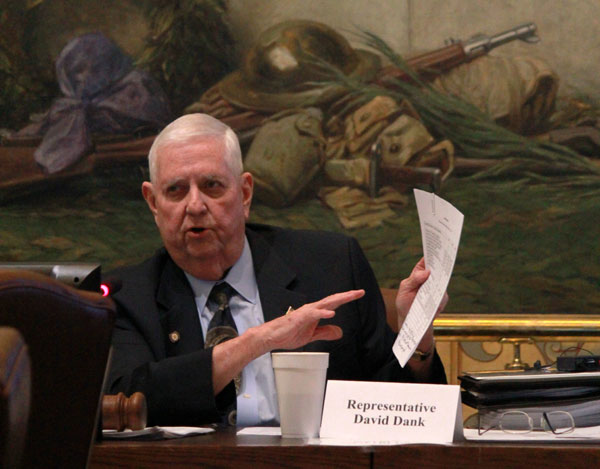
Caption
Joe Wertz / NPR StateImpact


Caption
Joe Wertz / NPR StateImpact

Joe Wertz / NPR StateImpact
Tax credit task force members expect businesses, lobbyists and fellow state lawmakers to fight efforts to rein in tax credits and economic incentives.
The tax credit task force on Wednesday formally approved its final report and a list of recommendations to be considered by Gov. Mary Fallin and the Legislature.
Over months of meetings, the task force heard from industry insiders, small and large business leaders and state officials, who defended specific credits and incentives. The testimony was diverse, and included energy executives, railroad owners, tourism officials and independent filmmakers.
At the tenth and final meeting, the task force voted for pre-approval and increased transparency for all tax credits and economic incentive programs.
“Let the battle begin,” said Rep. David Dank, R-Oklahoma City, the task force co-chairman.
It already has.
Officials from Oklahoma’s three largest chambers of commerce recently sent Dank a letter opposing several of the task force’s recommendations, reported CapitolBeatOK.
The State Chamber, Greater Oklahoma City Chamber and the Tulsa Metro Chamber disagreed with three components of Dank’s nine-part plan, which laid the framework for the panel’s recommendations.
According to CapitolBeatOK, which obtained a copy of the letter, the chambers oppose:
The chamber trio backed other task force recommendations, including caps, sunset provisions and regular auditing, CapitolBeatOK reported.
Beyond the panel’s recommendations, Rep. Dank, on Wednesday called for a one-year moratorium on tax credits while legislators determine which ones should be eliminated. A current moratorium on about 30 tax credits expires at the end of FY 2012.
The moratorium would not apply to incentives such as the Quality Jobs Program or for the oil and gas industry, he said, according to the Tulsa World.
A new moratorium could free up between $100 million and $150 million, Dank said. Lawmakers are facing a $150 million budget hole next year, state finance officials warned this week.
Businesses won’t be the only ones fiercely defending threatened tax credits.
Rep. Earl Sears, a task force member and chairman of the House Appropriations and Budget Committee, told Oklahoma Watchdog that he expects some resistance from the task force itself.
” … there are members that believe that some of these need to stay in place, that they are a benefit to their particular district.”
State agency and department officials are also likely to mount serious opposition to legislation aimed at curbing credits and incentives.
At a task force meeting in October, the Oklahoma Film and Music Office defended film incentives, which give qualifying movie projects as much as a 37 percent rebate on in-state expenditures. The program is capped at $5 million per year, and the film office has already tried unsuccessfully to get the legislature to double the cap to $10 million a year.

The Film and Music Office defends film industry incentives in the current issue of Oklahoma Today, which is published by the state Tourism Department.
Jill Simpson, director of the Film and Music Office, defended the film rebates as “a proven moneymaker” in Oklahoma Today‘s January/February edition, which is dubbed “The Film Issue.”
“If a program with a rebate of $5 million is generating $40 million a year, that’s good for Oklahoma,” Simpson told Oklahoma Today, which is published by the state Tourism and Recreation Department — which oversees the Film and Music Office.
Rep. Sears, R-Bartlesville, told StateImpact that the task force isn’t calling for an outright elimination of all tax credits and incentives.
“The simple fact is that some of these work, and some don’t. As a lawmaker you’re sensitive to ones that have a particular tie to the people in your district, but some just aren’t worth it. We’ve got to rein them in.”